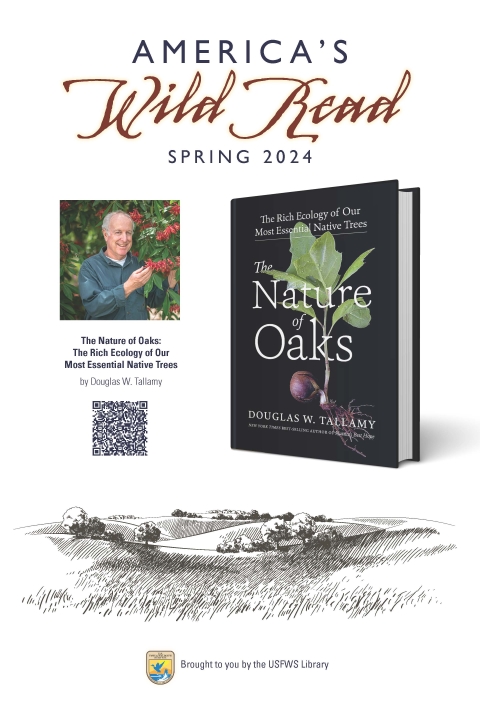From Little Acorns Grow Mighty Oaks
Join Us For Our Spring Wild Read!
This spring as the trees put on a show by bursting with bright foliage, the USFWS Library is reading The Nature of Oaks: The Rich Ecology of Our Most Essential Native Trees by Douglas W. Tallamy.
Oaks are some of the most ecologically and economically significant trees in the world. These mighty and majestic long-lived trees play a pivotal role in supporting wildlife, both as a habitat and as a crucial food source. Did you know that a single oak tree can yield an astonishing three million acorns in its lifetime? A wide array of species including deer, squirrels, and a variety of birds heavily rely on acorns for energy and nutrition. The sturdy structure of oaks provides essential habitat to owls, raccoons and squirrels. Oak trees also host a wide range of butterflies, moths, and wasps- playing a critical role in the food web. Douglas argues, “This rich ecology goes largely unnoticed and unappreciated by most homeowners and even trained biologists.”
Douglas Tallamy has written this book to guide us through the cyclical life of oaks over the course of a year. He educates readers on how to identify oaks by their leaves, understand their role in the food web and the countless ecosystem services they provide. Oak trees support more forms of life and fascinating interactions than any other tree genus in North America. Whether you have or want oaks in your yard, or just appreciate their irreplaceable role in the health of our environment, this spectacular book will ensure you never look at a “common” oak tree the same way ever again.
Douglas W. Tallamy is a professor in the Department of Entomology and Wildlife Ecology at the University of Delaware, where he has authored 97 research publications and has taught insect-related courses for 40 years. Chief among his research goals is to better understand the many ways insects interact with plants and how such interactions determine the diversity of animal communities. Doug is author of Bringing Nature Home, Nature’s Best Hope and The Living Landscape; and co-founder of Homegrown National Park. He has changed the conversation about gardening in America and urges homeowners to take conservation into their own hands. Now, he is turning his advocacy to one of the most important species of the plant kingdom—oak trees.
If you are an FWS employee, you can access an eBook of The Nature of Oaks. We are also offering our Wild Read selection as an audiobook. Find the USFWS Library on Libby to borrow. For more instructions, see the Libby Library Guide. FWS employees may also email catherine_blalack@fws.gov to borrow a print copy as available. For the general public, The Nature of Oaks can be found at your local library or bookstore. Check out our list of discussion questions as you read along.
We hope you join us for the online book discussion of The Nature of Oaks on Thursday, May 16that 3 PM EDT. Please register in advance. The Wild Read book club meetings are a place where the readers reflect on the reading, answer discussion questions, and connect through a conversation on conservation literature.
